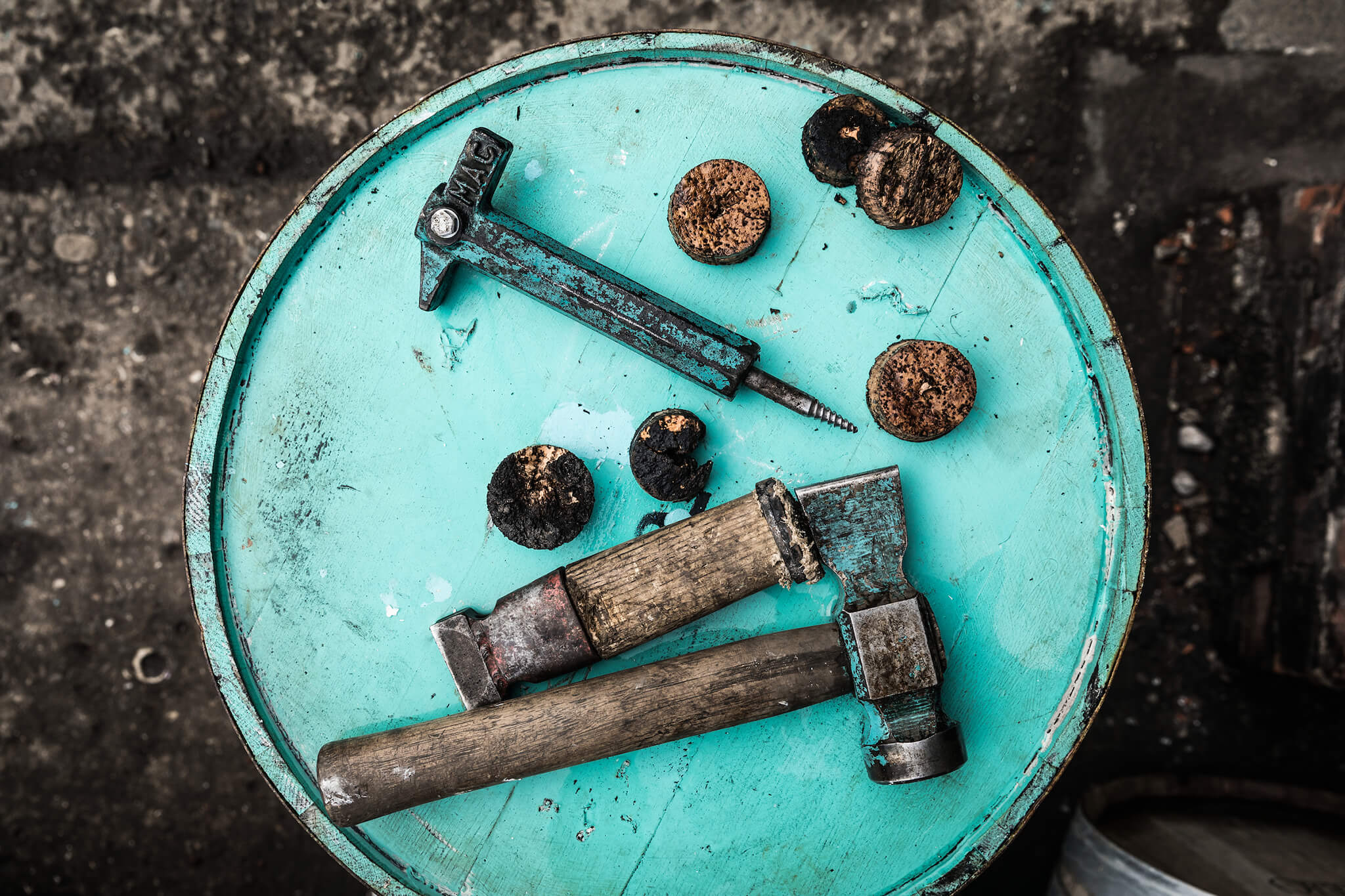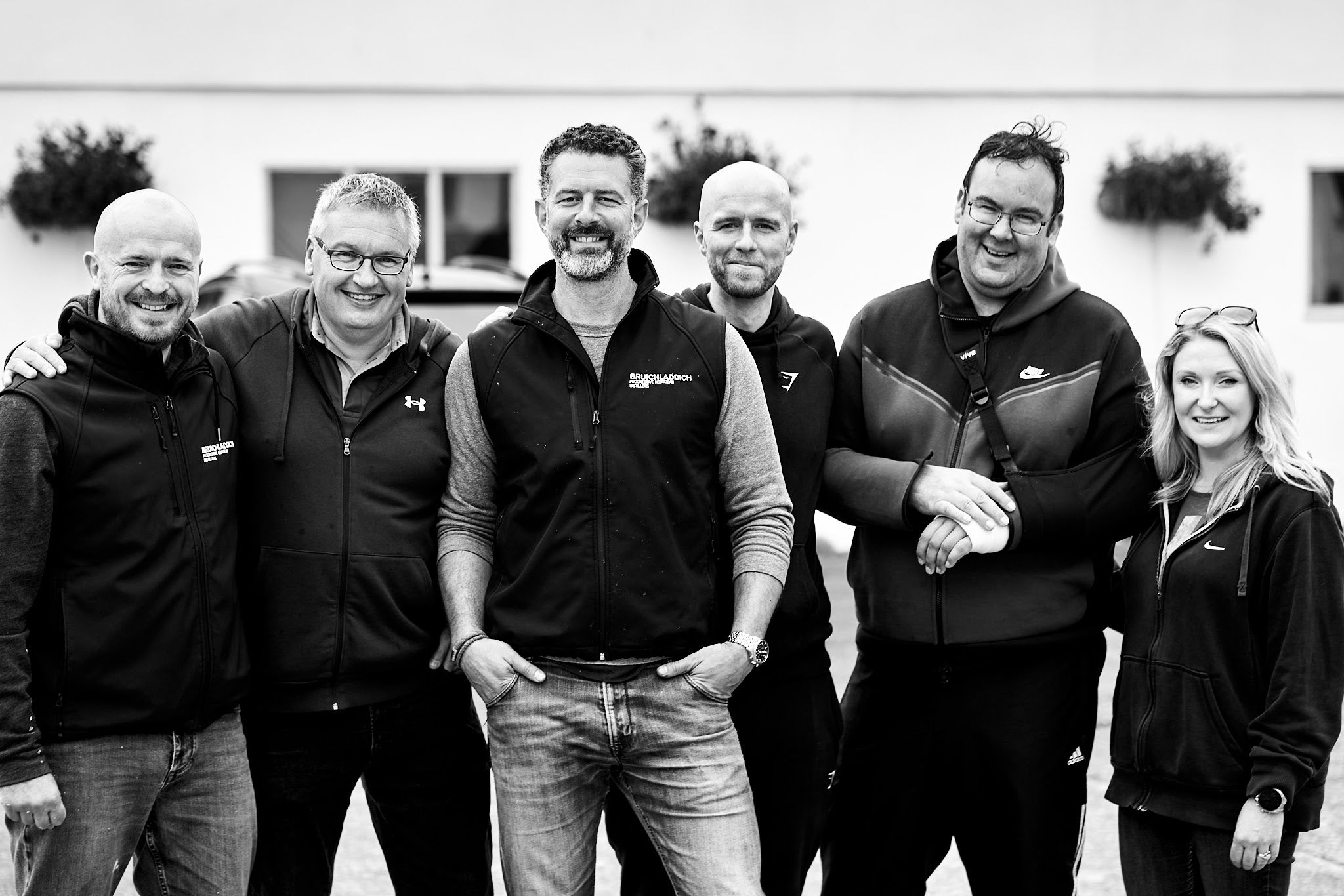
GLOSSARY OF WHISKY WORDS
A glossary of words, phrases and acronyms to help navigate whisky-making terminology
AGE
(noun)
“Age is a number, not a feeling” as they say in teen romance. Nor is it necessarily an indicator of a whisky’s quality. Our approach is to release whisky whenever our Head Distiller deems it ready, whenever the character of that whisky is at its peak. So, for example, if it’s something from our barley exploration series where we’re wanting to taste flavours from a specific barley, he’ll likely let that out of our warehouses when it’s younger, so that the cask influence doesn’t take over.
Whiskies that are older are rarer and more expensive, and that has been open to exploitation in the past, meaning that a law was created to dictate that only the youngest whisky in any bottling can be declared. But that law now means we can't reveal the full recipe of our multi-vintage cuvees like the Classic Laddie as we would like. Read more about our transparency work here.
AWNS
(noun)
The fine hairs or bristles on barley that help contribute to seed dispersal, burial, and photosynthesis. According to Haystack Mountain most barley species tend to have long awns however their appearance and length can vary between barley varieties. Through their awns, barley varieties are described as “expressing their beards”.
BAIRD'S MALTINGS
(noun)
Our malting partners based in Inverness who have been malting barley since 1823. The malting process is about converting the grain into malt by inducing germination of the barley. First the barley is soaked in water, allowing it to sprout and then drying it out to stunt the growth. One of the skills of the maltster is stopping germination at the optimum time to preserve the enzymes which are later extracted during mashing. Bruichladdich have been working closely with Bairds Maltings in Inverness since 2002.
BERE BARLEY
(noun)
Bere barley (pronounced “bear”) is one of Scotland’s oldest remaining cereals in cultivation. It has six rows of kernels as opposed to the two or four rows on conventional barley varieties. It’s a robust crop that can withstand poor soil conditions and harsh climates and has been growing in the North of Scotland for over a thousand years. This variety of barley not only ticks our boxes of provenance and research because of its rich genetics, but also flavour.
THE BUDGIE
(noun informal)
Longest-serving employee, since 1989 non-stop; before that an Islay Creamery man. Never short of a story, he’s notoriously knowledgable and softly spoken. His mother was born in a house that stood where our warehouse 12 is now. Christened Duncan, he got the name Budgie in his school days at Gorton, no one can remember why.
Cask
(noun)
The vessel used for maturing whisky. Also used as in-kind currency for negotiations such as lorry acquisition in the early days of Bruichladdich.
Coultorsay
(noun)
The site of our newest warehouse complex situated behind the distillery. Before the erection of these new buildings, production manager, Allan Logan made the decision to slow down the production of spirit due to lack of cask storage space on Islay. He insisted that maturation of Bruichladdich whisky would only ever take place on the island, rather than shipping any over to the mainland. Maturing on Islay is important in order to impart a subtle coastal influence into the spirit. Each warehouse at Coultorsay can hold c. 10,000 casks. Planning permission has been granted for the construction of 16 warehouses in total, of which 12 are almost complete and four and a half already filled with casks. It’s a huge investment in Islay.
DISGORGE
(verb)
The emptying of whisky casks once maturation is complete. The spirit is emptied through the cask bunghole into the disgorging trough, where a fine mesh catches any fragments of charcoal that have come away from the inside of the vessel.
DUNNAGE
(noun)
A centuries-old style of warehousing in which casks sit on their sides, no more than three rows high. They are held in place with lengths of wood called skeeds and triangular wedges called scutches – Mesopotamian technology. Dunnage warehouses are usually made with stone walls and natural dirt flooring to help retain moisture in the warehouse, limiting spirit evaporation during maturation. Dunnage storage is significantly less efficient than palletised or racked warehouses as the ceilings are much lower meaning machinery cannot operate inside, so most casks need to be moved manually.
Flagging
(noun)
A natural reed that is fitted into the edges of cask ends and staves to seal the cask and avoid leaking. Watch a video of how this is done at Bruichladdich
HYDROMETER
(noun)
An instrument found inside the spirit safe used to measure the correct density or gravity of the liquid in order to test the amount of alcohol. This information is recorded by our skilled production team to assist them with finding the optimum times to cut the spirit into foreshots, middle cut and feints. Our warehouse team also use hydrometers to check the alcohol strength in our whisky during maturation.
INCH
(noun)
The way we measure how many gallons of water are in our brewing tanks in the Mash House. 1 inch= 44 gallons of water.
LOCHINDAAL
(noun)
The sea loch in front of the distillery which stretches from the south to the west of the island. Loch Indaal means ‘Loch of Delay’ and got its name due to ships that would sail into the bay for shelter and would often get delayed for days.
MATURATION
(noun)
After the new-make spirit is transferred into a cask it is moved to a bonded warehouse to begin maturation. For a spirit to legally be named whisky it must remain in a cask for a minimum of three years and one day. At Bruichladdich, this entire process is done on the island across our warehouses onsite, at Coultoursay and Port Charlotte.
Time in the cask brings about many changes to the taste, colour, and aroma of the new make spirit. Character is added from the contact with the wood and also through evaporation of the spirit through the wood and into the atmosphere, known as the Angel’s share. The exact process of maturation is remarkably complex, and a full understanding is yet to be obtained. Ten of our casks are currently being analysed by Professor Otto Hermelin of Stockholm University to gain a more scientific understanding of what happens during maturation and how certain conditions in the warehouse affect it.
NEW-MAKE SPIRIT
(noun)
The name given to the middle cut before it has been matured in a cask. It must remain in a cask for a minimum of three years and one day before new-make spirit can legally be classed as whisky. Bruichladdich’s new-make spirit has a distinct light, floral, green apple and pear character which has a lot to do with the long, swan-necked stills and slow, simmer distillation.
OCTOMORE SPRING
(noun)
Once the water source for the village of Port Charlotte, the spring at Octomore farm is now collected at source in the glen and transported to the distillery on regular days through the week by farmer James Brown. It is the water used at the bottling stage to bring our whiskies to the required ABV, if they aren't being released at cask strength. Octomore spring water has been filtered through ancient rocks and is completely pure having had no chemicals added; just 100% Islay water.
PLAIN OAK
(noun)
Also more commonly known as ‘refill’ casks, this refers to casks which have been filled more than twice. These casks still have subtle amounts of sugars and compounds, but don’t influence the spirit character as much as first or second fills would. Plain oak casks are often used to mature older whisky for long periods of time, in doing so ensures the cask doesn’t dominate the spirit inside. In the Bruichladdich warehouses plain oak or refill casks are painted laddie aqua.
STOW
(noun)
A row of casks packed in a warehouse.
TERROIR
(noun)
A French term, used commonly in the wine industry, relating to how a particular region’s climate, soil and terrain where grapes are grown affect the final character of the wine. Thinking about where the barley comes from to make whisky in these terms opens up bigger questions about what is being grown, and how, where, by whom.
At Bruichladdich we believe terroir matters; whisky should speak of where it was made. This imparts subtle nuance and variety to the flavour, aroma and texture of our whisky, and also recalibrates how we approach ingredients with greater transparency and responsibility.
VALINCH
(noun)
A long tube, traditionally made from copper, used for extracting spirit from a cask. This apparatus is used frequently in the warehouse for sampling whisky via the bung hole without having to empty the contents of the cask.
WASH
(noun)
The name of the low-alcohol liquid made from the fermenting/fermented worts, as the sugar is converted to alcohol by yeast. Our wash ferments for an average of 72 hours which results in a beer-like substance of between 6-8 % ABV. This process takes place in one of our six washbacks. They are made from douglas fir – wood makes a good vessel for heat regulation during fermentation.
YEAST
(noun)
A micro-organism used to ferment the sugary water called wort after mashing. The addition of yeast to the wort in our wooden washbacks is often referred to as ‘pithing’. After several controlled experiments to determine the best choice of yeast, we use a mix of fast and slow acting compressed wet varieties in order to extend the activation stage.
- A
-
AGE AGE
-
AWNS AWNS
- B
-
BAIRD'S MALTINGS BAIRD'S MALTINGS
-
BERE BARLEY BERE BARLEY
-
THE 'BUDGIE' THE BUDGIE
- C
-
CASK Cask
-
COULTORSAY Coultorsay
- D
-
DISGORGE DISGORGE
-
DUNNAGE DUNNAGE
- F
-
FLAGGING Flagging
- H
-
HYDROMETER HYDROMETER
- I
-
INCH INCH
- L
-
LOCHINDAAL LOCHINDAAL
- M
-
MATURATION MATURATION
- N
-
NEW-MAKE SPIRIT NEW-MAKE SPIRIT
- O
-
OCTOMORE SPRING OCTOMORE SPRING
- P
-
PLAIN OAK PLAIN OAK
- S
-
STOW STOW
- T
-
TERROIR TERROIR
- V
-
VALINCH VALINCH
- W
-
WASH WASH
- Y
-
YEAST YEAST

